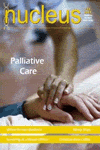- Take a good history; be sure she is not pregnant.
- Take her through the contraceptive options including mechanisms of action for the combined oral contraceptive pill, progestogen-only pill (POP), male and female condoms, Depo-Provera injection, Implanon and the new patch system.
- Only prescribe what your conscience allows you to. For example, if you decide (as I have) that life begins at fertilisation, then you may feel unable to prescribe the POP (see Professor Guillebaud’s article in Triple Helix).[2]
- Finally, consider challenging any peer pressure she is experiencing, and her (probable) belief that sex is essential to a premarital relationship. This is a difficult one and needs to be done gently and respectfully. ‘Have you thought about waiting to have sex until you are older, with someone really special?’ Different girls may require different levels of challenge. Consider whether her boyfriend is pressuring her. Bear in mind this girl is sensible; many don’t come to their GP until after the event.
One issue not covered last year was protecting people from STIs. A young woman relying on the pill alone will put herself at considerable risk in the culture of serial monogamy. Those who start having sex younger tend to have more partners over their lifespan, thus increasing their chances of an STI.[3] Ensure she is aware that the pill will not protect her from STIs, and discuss the different infections she is at risk from. Some of these have unpleasant symptoms that may affect her future; chlamydia is a silent infection that is blamed for rising levels of female infertility in the UK. Evidence indicates that it also lowers male fertility.[4]
The government is keen on the ‘Be safe! Use a condom!’ message. Condom use along with the pill will help protect couples from both STIs and unwanted pregnancy. However, the condom on its own is only around 90% effective in preventing pregnancy. It can’t be any more effective against transmission of STIs, particularly when you consider that pregnancy only occurs during the fertile phase of the menstrual cycle, whereas STI transmission can occur throughout. Condoms reduce the risk of HIV by 85-90%.[5] For chlamydia they are no more than 50-60% effective.[6] To continue misleading young people with the ‘safe sex’ message is damaging to their health, and wrong.
Condom failure results from two distinct reasons: method failure and user failure. User failure is higher among younger inexperienced users. Additionally, the protection offered by condoms in a sexually active population may be cancelled out by risk displacement: adolescents who believe they are protected from STIs by condoms may actually become more sexually active, resulting in an overall increased risk of STIs.[7]
Uganda has had good results in its fight against HIV. While neighbouring African countries stuck with the safe sex message and watched HIV rise throughout the 1990s, Uganda went for a behavioural change approach. The ABC message (Abstain, Be faithful (together) and Condom use) was simple but extremely effective in reducing HIV prevalence from 21.1% in 1991 to 6.4% in 2001. It was communicated widely across the country’s political, cultural, social and religious networks. Of the ABC options, 48% of Ugandans reported they had remained faithful to their partner, 11% of women and 14% of men said they had stopped all sex and 2.9% of women and 12.5% of men said they had started using condoms.[8] This highlights the importance of changing sexual behaviour, particularly partner reduction.[9]
For adolescents, delayed sexual debut is a key factor. They need to be aware of the risks and benefits of each ABC option to make informed decisions.[10] With considerable rises in all STIs in the UK, Christian doctors should be leading the way in informing patients of the best way to protect themselves from STIs. It should not surprise us that good research has backed up the truth of God’s Word: sex is a special gift and should be used responsibly in the context of marriage, as he designed.
Enigma 9
A sharply dressed 50 year old man comes for an urgent appointment at the end of morning surgery. He is the chief executive of a local company. The directors have sent him home because it has been discovered that he has been using his PC to access pornography.
What issues need to be raised in this consultation? How do you feel towards him? How can you help him? Responses to john.wenham@orange.net
































